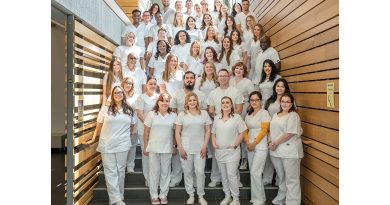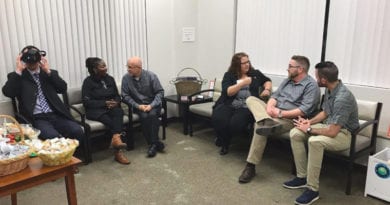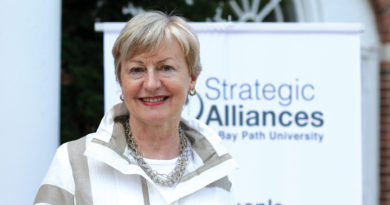The Arbors Celebrates 25 Years of Business of Growth, Diversity
Staying Power
By Kailey Houle
For the past 25 years, Sara Robertson and her family have run one of the most successful assisted-living facilities in Western Mass. and now Northern Conn. But she stressed repeatedly that this success did not come easily.
“We learned early on about the importance of all the hard work and dedication that our grandparents and parents put into evolving and growing the company,” she said, “and just how challenging making your own success truly is.”

Robertson, co-owner, her sister Emily Quinn, and cousin Amie Hanrahan grew up working for their parents and grandparents. Starting as teenagers, they handled just about every job one can take on at an assisted-living facility — landscaping, dishwashing, housekeeping, and more. Those assignments taught some invaluable lessons and have helped guide them every day as they manage Arbors Assisted Living Communities, grow the family business, and take it in new directions in this broad sector — everything from home care to memory care, as we’ll see.
Those same lessons helped guide the company and its leadership through the pandemic and the myriad challenges it brought to all those working in assisted living and related businesses.
“We learned best practices to keep our residents in communication with their families and loved ones when they weren’t able to visit,” Robertson told HCN. “We adapted to new ways of activities and dining options. We eventually found our new normal, and all the practices we have in place to keep our residents and staff safe are a part of our everyday life now.”
Building Blocks
As the Arbors celebrates 25 years of success, growth, and evolution, Robertson reflected on where this family has been, where it is today, and where it might go in the future. She began with some history, starting with the venture known as E.A. Gralia Construction, launched by their grandparents.
“They would build everything from hotels and plazas to senior housing like Wilbraham Commons and facilities like that,” said Robertson. “Then my parents basically started to focus on senior housing.”
We eventually found our new normal, and all the practices we have in place to keep our residents and staff safe are a part of our everyday life now.”
They built more than 5,000 housing units, as well as schools, hotels, nursing homes, and several elderly-housing developments, she went on, adding that, when this second generation took control of the family business, it evolved into what is now Arbors Assisted Living Communities.
From the beginning, the family sought out growth opportunities, and took full advantage of them.
Indeed, senior housing was available in Agawam and Wilbraham, but not in many other places around Western Mass. at the time, Robertson said. The first Arbors facility was built in Amherst in 1998. Five more facilities were added by 2009, in Chicopee, Greenfield, Stoughton, Taunton, and Westfield.
“At the locations [Agawam and Wilbraham] that our parents managed, we would do landscaping or activities or housekeeping,” she explained. “From there, they evolved into creating assisted living. Assisted-living facilities were few and far between at that point in time; we were one of the first assisted living in the area. And it obviously is an industry that has grown exponentially from there.”
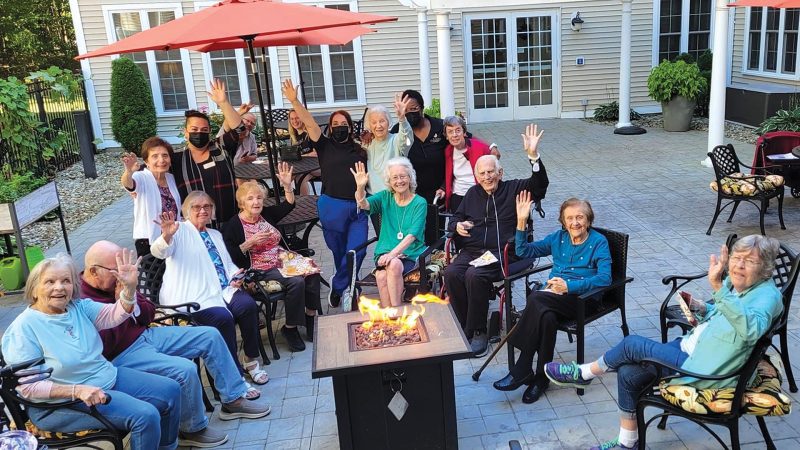
The Arbors offers independent-living, assisted-living, and memory-care services. Robertson told HCN that all needs are diverse and vary from person to person, so individuals are able to create their own service plan, detailing their personal-care needs and preferences.
Each resident has their own private apartment with a full kitchenette, private bathroom, living room, and bedroom. Staff members assist individuals with everyday tasks, such as bathing, dressing, preparing meals, and managing medications.
Respite services and short term/trial stays are also possible at the Arbors. With move-in-ready apartments, individuals are able to stay and make sure they find the right fit.
In 2010, the third generation took over the Arbors management, making it a women-owned and operated family business. Robertson, Quinn, and Hanrahan started Integra Home Health Agency and built new assisted-living facilities in Dracut and Stoneham. The third generation also created a Connecticut brand, the Ivy at Ellington and the Ivy at Watertown.
We will always have the most fragile population that lives with us, so we have to remain diligent now and in the future knowing public-health crises are possible.”
“At this point, we were fully immersed in the senior-living industry and our careers, so we decided to grow again,” Robertson said. “Our assisted living was all-inclusive. A lot of assisted-living facilities at the time were starting to transition into levels of care. We didn’t really want to do that because we liked that it was all-inclusive pricing at the time. So we were utilizing Integra Home Health to kind of fill that void to cover additional services that our residents needed that we weren’t able to offer. It took the business to the next level.”
Integra Home Health Agency offers personal healthcare services for those who feel more comfortable staying at home but need additional support beyond the basic assisted-living services. Integra’s staff can work alongside hospice agencies and also provide services to those in senior housing and nursing homes. They provide transportation to doctor appointments, as well as companion services to keep clients company, spend quality time, reminisce, and play games. The company also offers a variety of personal-care and memory-care services right in clients’ homes.
The Arbors has also diversified into memory-care services through its Reflections Memory Care Program, designed with four specific, resident-centered focus areas — life enrichment, personal care, serenity enrichment, and multi-sensory dining — to specifically address the challenges of living with memory loss and cognitive challenges.
Residents live in a specifically designed neighborhood that provides a safe and secure home with private apartments for each resident. The environment of Reflections is designed to minimize challenges and barriers, and to inspire confidence, peace of mind, and independence so each resident has the freedom to move about in a familiar, recognizable environment.
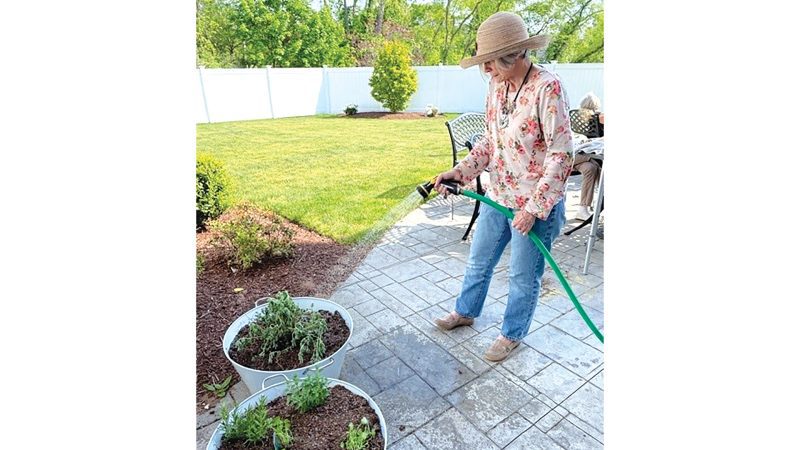
Through the years, Robertson said the leadership team at the Arbors has “fine-tuned the services we offer with current trends,” such as offering ‘anytime dining’ at its Connecticut locations and providing levels of care for services since assisted living is not a one-size-fits-all scenario.
“We listen to what our customers want and hopefully can work those suggestions into our offerings,” she said. “We also have a full array of activities and programming in our communities; social-engagement directors and memory-care directors create monthly calendars of a wide variety of options. Some examples might be exercise programs, card games, outings on the van, travel series, entertainment, cocktail hours and socials, lectures, religious services, arts and crafts, and so much more. There is something for everyone.”
At Home with the Idea
Robertson told BusinesWest that in college, she studied business and hospitality, but Quinn, co-owner and regional marketing and sales director, and Hanrahan, co-owner and co-director of Integra Home Health Agency, pursued degrees in communications and marketing, so they all have their own specialty when it comes to the business.
As long as Robertson can remember, the family business was something she’s always wanted to pursue.
“Growing up in a family business is unique in that your entire world revolves around business; you hear it at the dinner table, at family get-togethers, even at holidays,” she told HCN. “I think at one time or another, all of us pondered what we really wanted to do in life, but the family business pulled us in. We had to be willing to put in the same amount of hard work, determination, and dedication that our parents and grandparents did.”
Robertson’s parents and grandparents never had to experience a pandemic like COVID-19. But the third generation took lessons from those who came before them — especially those involving hard work, determination, and dedication — to persevere through a period that tested them in every way imaginable.
Because assisted-living facilities have the most fragile populations to protect and keep safe, Robertson and her team had to learn to adapt and pivot in real time. There were safety guidelines coming from different agencies that had to be maintained and communicated to the staff weekly.
Robertson described the past few years as “by far the most challenging of our careers.” Not only did they have to pivot on the fly and adjust to constantly changing guidelines, but they had to cope with rising amounts of fear within the community about senior-living facilities, home care … essentially every aspect of their multi-dimensional business.
She went on to explain that making “huge life decisions” became even more challenging than they already were. The main goal was making residents comfortable with where they were and what they needed from the facilities and their loved ones.
Recovery took time, she added, as people needed time to feel comfortable again with placing their loved ones in an assisted-living community or to allow a caregiver into their homes.
“We had to be patient, yet stay front of mind,” Robertson said. “We had to get more creative in our marketing efforts, hosting outdoor events, drive-through dine-and-dash events, hot-chocolate deliveries, home visits, and so much more.”
The pandemic threw the Arbors facilities a curveball since it forced the company to stop growing its brand, so its leadership could focus all of its efforts on the safety of its current residents and on recovering and improving services.
Robertson said that they wouldn’t have made it through the pandemic without their staff. “They worked tirelessly under difficult circumstances for several years now. We were and are lucky to have them.”
As COVID restrictions loosen and the pandemic comes to a close, Robertson and her Arbors teams are continuing to grow the business. The industry has matured, and smaller family businesses have diminished, but being able to assist and serve more residents and more families has always been the top priority, moreso now than ever.
“I think people in general have learned to navigate the pandemic, making choices that are right for them and their families. We still have safety protocols in place in our industry,” she told HCN. “We will always have the most fragile population that lives with us, so we have to remain diligent now and in the future knowing public-health crises are possible.”
She went on to explain that she has always said, “it is our family taking care of your family.” Robertson, Quinn, and Hanrahan are heavily involved in the daily operations and intend to continue in those roles. Whether there is an issue to address or someone just needs a friendly face to talk to, the third generation is right on the front lines, just as those who came before them.

